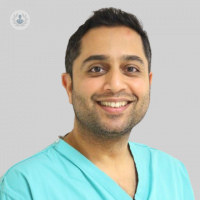An insightful guide about endometriosis
Written in association with:Here, highly regarded consultant gynaecologist and advanced laparoscopic surgeon, Mr Hemant Vakharia, details what endometriosis is, whilst also outlining the symptoms and causes.

What is endometriosis?
Endometriosis is defined as the presence of endometrium-like tissue outside the uterus. It is a condition when the ‘lining of the uterus’ (also known as endometrium) is found outside the uterus. During menstrual period, this endometriotic tissue also bleeds and swells up but unlike the cells in the womb this blood has nowhere to escape. That’s why pain during periods is a common symptom of endometriosis.
Endometriosis is an oestrogen driven, chronic inflammatory condition that most commonly affects pelvic organs but can also in some cases occur at different areas of the body including the bowel, diaphragm (a muscle that sits at the base of the chest) and in the chest cavity.
Endometriosis is very common, affecting 10 percent of women in the UK, although not all will experience the symptoms. It affects women of child-bearing age regardless of race and ethnicity.
It can present in several ways. Whilst pain is a major feature in endometriosis, the impact it can have on those who suffer with it can be enormous, which is why prompt diagnosis and treatments are crucial.
What are the main symptoms?
Symptoms of endometriosis include:
- Painful periods (dysmenorrhoea) – the endometriotic cells are stimulated by hormones in your natural cycle which causes inflammation and pain. It is important to also recognise that some patients experience pain throughout their cycle and not just with their periods.
- Pain with intercourse (dyspareunia) - The inflammation can lead to structures in the pelvis sticking together and lead to thickening of tissues. This can occur in the area between the vagina and bowel and around the pelvis. As a result, patients with endometriosis can have pain with intercourse.
- Pain opening your bowels (dyschezia) - In patients who have endometriotic deposits on bowel, or in those where the inflammation has caused their bowel to stick to other structures, it can be painful to open their bowels. This can occur with their periods or all the time.
- Other issues include: Chest pain when on your period (occurs if there is endometriosis in the chest cavity or around the diaphragm, difficulty conceiving, or ovarian cysts (which can be large) if endometriotic cells are on the ovary.
Why is endometriosis research often under-funded?
Sadly, data has shown it takes around eight years for patients to be given a diagnosis of endometriosis. Increasing awareness and specialist access has meant that patients are more aware of the symptoms of endometriosis and can approach their doctor to be investigated and seek treatment.
However, for a condition which is so common affecting nearly 10 percent of all women, more research is needed for quicker diagnosis and effective non-surgical treatments. It often takes 10 years for any research to translate into clinical practice, so coherent research strategy is urgently needed. Royal College of Gynaecologists, National Institute for health and care research and the Women’s health strategy for the UK government have endometriosis at the forefront of their agenda for research for improving women’s lives.
To book a consultation with Mr Hemant Vakharia today, visit his Top Doctors profile.


